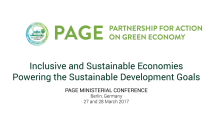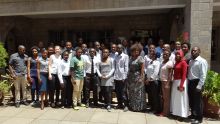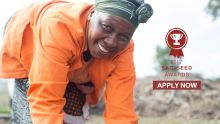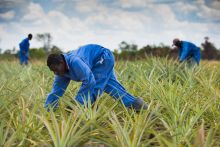- Have you ever heard of Burkina Faso’s “Green Brigade”? Picture teams of dozens of women regularly cleaning the streets of Burkina Faso’s capital Ouagadougou at dawn! Many urban dwellers in the country’s capital have testified for the positive contribution of the green brigade to the cleanliness of the city.
- Imagine thousands of low-income women farmers whose lands are degraded and infertile because of overuse. How can they continue farming to provide for their children and families?
The DEA of South Africa and SEED raise awareness for eco-incusive enterprises and incubate aspiring future entrepreneurs.
- As one of 15 selected “Green Economy Pioneers” SEED was invited to demonstrate its innovative approaches.
Soil gives life and opportunities. Having land with “good” soil can mean the difference between thriving plants and those struggling to stay alive.
- The deadline for the Replicator in Ghana & South Africa has been extended to Thursday, 16 March!
- SEED and SWITCH-Africa Green are pleased to invite applications for SAG-SEED Replicator Connect Workshops in Kenya and Uganda.
- SEED and SWITCH-Africa Green are pleased to invite applications for SAG-SEED Replicator Connect Workshops in Ghana and South Africa.
- “For every challenge society encounters, there is always an opportunity that presents itself. But we waste a lot of time crying over the challenge and we miss the opportunity.” This statement means a lot to Otim George William, CEO and Co-Founder of Tii Kikomi Cassava Commercial Growers (TCCG)...
- SEED has opened the call for applications for 15 SWITCH Africa Green (SAG) – SEED Awards for enterprises in Burkina Faso, Ghana, Kenya, Mauritius, South Africa and Uganda.
Time for the second cohorts: Switch Africa Green and SEED announce today a call for applications for the second rounds of the Starter Months in both Ghana and Uganda.
- Along the coast of Kenya, just north of Mombasa, the Watamu National Marine Park and Reserves grace the coastline. In recent years, however, Watamu has struggled with increased solid waste pollution.
Kenya, where our first Impact Financing Lab took place, is one of the global centres of impact investing! But even there, many challenges for deal flow exist…
At the 2016 SEED Africa Symposium in Nairobi Ligia Noronha, Director of the UNEP Division of Technology, Industry and Economics, underlined that “Replication is a key theme to foster green growth and sustainable development”. But replication demands targeted support at every stage, which calls for collaboration between diverse support providers and a strong ecosystem.
“Be creative, be unafraid, and take that step off the mountain. I assure you it’s worth it.” This advice from Lynn Worsley, the founder of the successful eco-inclusive enterprise and 2014 SEED South Africa Award Winner All Women Recycling, encourages women who are considering founding their own social enterprise to go for it.
- With this year’s theme of the World Food Day on October 16th, the Food and Agriculture Organization (FAO) chose a strong message that tackles key issues of our modern global society. Indeed, climate, energy and agriculture are all interconnected.
- “There is no problem in Africa that nobody has thought about. Use those ideas!” said Ndubuisi Ekekwe from the African Institute of Technology two weeks ago at the SEED Africa Symposium in Nairobi. And, Jukka Uosukainen from the Climate Technology Centre and Network added: “Take the best innovations of the world and copy them. Let's start copying. I love it!”
Working with more than 220 enterprises in 38 countries, we soon realized that although each enterprise is unique, topics are reoccurring. Instead of re-inventing the wheel each time, we put time and effort into ‘toolifying’ our support.
- It is a challenge to transition to a low carbon economy while improving the well-being of the world’s nine billion people. By replicating proven solutions, positive impact from eco-inclusive enterprises can spread, and facilitate the transition to a low carbon economy while also improving social conditions as set in the SDGs.
- East Africa Fruit Farm and Company: an outstanding enterprise, not just according to President Obama“[Entrepreneurship] puts rising economies on the path to prosperity and empowers people to come together and tackle our most pressing global problems, from climate change to poverty. When people can start their own businesses, it helps individuals and families succeed."
- The first steps as a startup are the hardest, especially for eco-inclusive startups in emerging markets. It all comes down to the right spirit and lion-hearted attitude.
- Agriculture still plays an essential role in the economy, and particular for employment on the African continent. Mozambique is no exception. In 2011, the agricultural sector contributed to almost one-third of the country’s GDP and provided a living for 80% of the working population.
- This past month, it was India’s turn, as SEED hosted an event around investment in the low-carbon, green SME sector. Whilst it’s fair to say that every region and country has its own challenges, it remains surprising how similar the discussion is and how clearly certain interventions are necessary in order to make the green SME space both more resilient and scalable.
Over the last three days, I’ve had the pleasure of attending the 2016 International Tech4Dev Conference, which focussed on innovation to achieve social impact.
This year’s South Africa Symposium brought together more than 200 entrepreneurs, practitioners, investors and policy makers to discuss how to grow and support social and eco-enterprises in South Africa. The event focused on two key challenges facing SMEs in South Africa.
- Worldwide heaps of waste are expected to double by 2015 according to the World Bank. The majority of it is burned, dumped into landfills or ends up in our oceans. The small minority of the waste we are producing is taken for what it really is: an important resource.
Last week I had the pleasure of attending New Ventures’ Foro Latinoamericano de Inversion Impacto in Merida, Mexico. It was an inspiring few days unpicking the latest developments in social entrepreneurship in the region and proved an interesting opportunity to compare to recent developments in Africa where I attended SEED’s African Symposium just a few months ago.
- Every child in the world has the right to access high-quality early childhood care and education, and every woman deserves the opportunity to participate in the workforce and generate income, free of concern that their child may not be cared for properly.
- Financing! 20k-200k USD is needed for the ‘missing middle’ is one of ten critical aspects that SEED emphasises as crucial for the growth of SMMEs.
As part of its extensive programme that has been built around an annual awards scheme promoting social and environmental entrepreneurship in developing countries, SEED developed a unique toolkit that addresses these key issues and lays out guidelines how to strategically integrate the imperatives of sustainability into businesses.


























